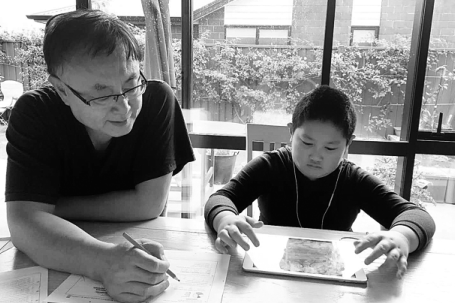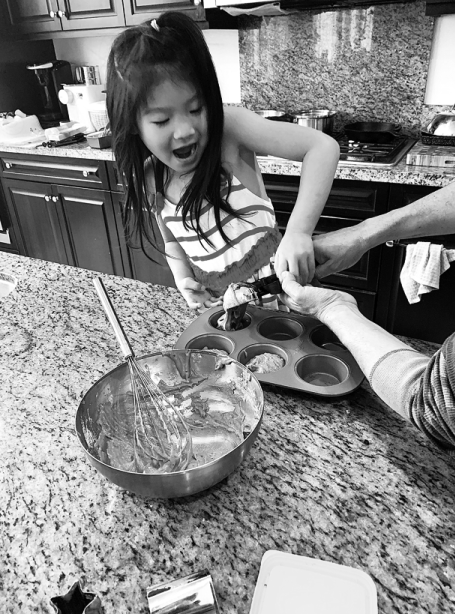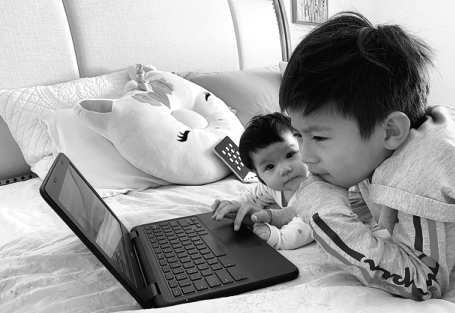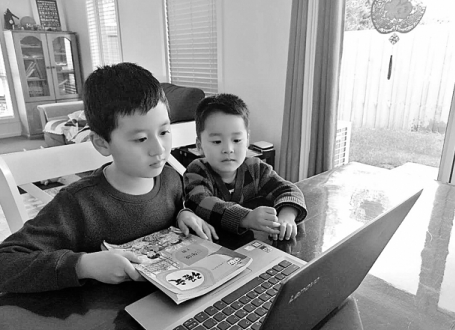Learning to integrate
Families overseas merge local study with Chinese online courses, Xu Fan reports.

A saying popular among Chinese immigrants to Western countries goes along the lines of "the mountains and waters are beautiful, but the life tastes lonely".
Now, as well as having to overcome cultural gaps and language barriers in far-flung places, overseas Chinese families are facing a new challenge brought forth by the unprecedented COVID-19 pandemic.
So far, statistics from UNESCO shows that 186 countries have closed their schools because of the crisis, which has affected more than 1.2 billion students, and interrupted classroom learning for at least seven out of 10 students worldwide.
Since China became the first country forced to launch a nationwide battle to contain the spread of the novel coronavirus, beginning in late January, a lot of Chinese families residing in foreign countries have kept an eye on news from home, enabling them to take precautions and be more prepared to cope when the crisis spread to their neck of the woods.
Evita Mei, a Chinese immigrant in Tauranga on the North Island of New Zealand, says she has rigorously followed updates from China since the Lunar New Year. In early February, she contributed to a donation organized by the NZ-China Friendship Society in Tauranga, which sent more than 6,000 pieces of medical equipment, including masks, disposable gloves and protective suits, to hospitals in Chongqing in Southwest China.
New Zealand's Ministry of Health confirmed the first COVID-19 case-an individual who had arrived in Auckland from Iran-on Feb 28.
With the rise of confirmed cases, in mid-March, Mei started to consider whether she should keep her 8-year-old son, Kimi, out of school to reduce the risk of infection.
"It was the morning of March 22. I happened to be discussing it with my husband over breakfast, eventually deciding that, if our city discovered its first COVID-19 case, we would stop sending Kimi to school," recalls Mei. A few hours later, a message popped up in her neighborhood WeChat group, which said that Tauranga had reported its first confirmed case, that of a local man in his 30s recently returned from the United States. So, the family quickly transitioned to a new way of life. Mei made a self-quarantine routine for her son, with a big part of the schedule benefiting from the huge e-learning market in China.
"Our school has assigned homework on Seesaw (a student-driven digital portfolio). We have access to home-learning programs aired on TVNZ. I select proper content, around one hour every day, for Kimi," says Mei.
New Zealand's Ministry of Education has partnered with TVNZ, the state-owned television network, to air educational programs hosted by local celebrities from April 15, comprising a total of six hours of content for children of different ages every weekday, about two hours for each age group.
Despite Mei being satisfied with the home learning arrangements made by Tauriko School, where her son attends fifth grade, she wanted to find more educational material to guarantee that Kimi didn't get bored during the rest of the day.
Armed with information shared by her friends in China, most of whom are mothers who had already spent two months selecting online classes for their offspring, Mei began tailoring her own plan.
Due to the COVID-19 outbreak, China's Ministry of Education postponed the return-to-campus schedule of the new semester. Instead, schools launched distance education and a lot of after-school tutoring institutions also shifted their model from classroom learning to digital platforms.
Thanks to the rich variety of domestic educational sources, Mei has arranged for her son to attend free online classes, ranging from Chinese to mathematics, streamed by TAL Education, a leading afterschool tutoring service provider in China.
She has also recruited a Chinese tutor to teach her son to play guitar through a video chat app, at 100 yuan ($14.11) per hour, around one-third the cost of the same service in New Zealand.
Now Kimi's daily schedule is quite full, and also includes sketching homework assigned by his art teacher in China, and finishing copies of past test papers for Australia's National Assessment Program-Literacy and Numeracy, as recommended by a friend of Mei's in Australia.
"Every day, my husband spends around 40 minutes figuring out the answers to the test so he can help Kimi check his work. During the class breaks, my husband and Kimi play table tennis," Mei explains as she describes the tight and efficient timetable.
The New Zealand government reduced its COVID-19 alert level from"4" to"3" on April 27, announcing that schools can reopen from April 29, but Mei says she won't send Kimi back to campus while concerns remain about the risk of contracting the virus.
Full schedule
Aside from using online learning resources from China, some Chinese immigrant parents are also trying to adapt more to local habits.
Lynn Wu, a Chinese immigrant in Hobart, the state capital of Tasmania in southern Australia, finds the daily routine of her 8-year-old son, Daniel, has become tighter since the boy's school has shifted on-site learning to distance education, mainly through online platforms like Google Classroom and Microsoft Teams.
Every weekday, Daniel opens the laptop to listen to his teachers' wide range of online classes, varying from maths, writing, music to German language lessons, and then does the assigned homework, which takes a few hours in total.
"My son's school hasn't been completely shuttered. Parents who have essential jobs are still allowed to send their children to school," says Wu.
As a housewife, Wu stays at home and also takes care of her second child, 3-year-old Andy. In early April, She and her husband-now working at home-decided to keep fourth-grader Daniel at home as well.
"My son's school has lent laptops to students unable to afford such facilities for digital classes. As Daniel cannot go to school, he feels quite excited to see his classmates and teachers online," says Wu.
Interestingly, Wu says she can also sense the cultural difference, as most immigrant parents, especially those from Asia, show a bit more anxiety about their children's education, while Australia-born families generally take a comparatively relaxed, laid-back attitude.
Recently, Australia has eased restrictions as the spread of COVID-19 on the continent begins to slow. On April 21, Channel NewsAsia reported that Prime Minister Scott Morrison announced that schools will be reopened for more children.
Wu says she feels proud about the effort of Chinese immigrants to combat the pandemic, especially after she read a local news report praising Chinese Australians and quoting Morrison as saying that they provided "one of the greatest defenses" in the early weeks of the outbreak.
"In early February when the Australian government had yet to order 14 days of self-quarantine for anyone entering Australia, most Chinese students, who returned from China after spending the Spring Festival holiday with relatives back home, chose to self-isolate for two weeks to reduce the risk of potentially spreading the virus," says Wu.
The school closures across the world are perhaps an unprecedented crisis, but it may also shape precious memories for many parents, who can now spend more quality time with their children.
Chen Mayo, a mother of three in Los Angeles, the Unites States, has a much busier life than before.
Her 10-year-old son Kevin, and 5-year-old daughter Nina, take turns to attend online classes.
With the rise of confirmed cases in the US, Mayo says her own art studio-where she teaches 15 students-has also been closed.
While her son's school has been closed since March 13, it has provided laptops and free lunches for all of the students.
As part of their home education, Mayo and her children prepared 20"love packages" as gifts for neighbors. Each package contains 15 masks, 20 alcohol-based sanitizing wipes and 10 pairs of disposable gloves.
During the break between classes, Mayo and her husband encourage their two children to bake cakes and plant vegetables, as well as learn to babysit for their 8-month-old sister.
"We are busy, but happy every day," she says.




Today's Top News
- Engagement with China pragmatic amid fraying transatlantic relations
- China submits first comprehensive policy document outlining its stance on WTO reform
- S. Korea's ex-president Yoon sentenced to life in prison on insurrection
- Chinese envoy urges advancing multilateral cooperation at UN committee meeting
- Takaichi officially reelected as Japan PM at Diet
- Xi sends Chinese New Year card in return to friends in US state of Iowa






























